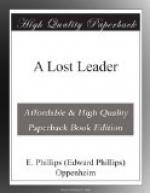“We’re getting frightfully modern,” she remarked, turning and waiting for him. “Mrs. Handsell and I ought to have come out here, and you and uncle ought to have stayed and yawned at one another over the dinner-table.”
“You have an excellent preceptress—in modernity,” he remarked. “May I?”
“If you mean smoke, of course you may,” she answered. “But you may not say or think horrid things about my best friend. She’s a dear, wonderful woman, and I’m sure uncle has not been like the same man since she came.”
“I’m glad you appreciate that,” he answered. “Do you honestly think he’s any the better for it?”
“I think he’s immensely improved,” she answered. “He doesn’t grub about by himself nearly so much, and he’s had his hair cut. I’m sure he looks years younger.”
“Do you think that he seems quite as contented?”
“Contented!” she repeated, scornfully. “That’s just like you, Richard. He hasn’t any right to be contented. No one has. It is the one absolutely fatal state.”
He stretched himself out upon, the seat, and frowned.
“You’re picking up some strange ideas, Clara,” he remarked.
“Well, if I am, that’s better than being contented to all eternity with the old ones,” she replied. “Mrs. Handsell is doing us all no end of good. She makes us think! We all ought to think, Richard.”
“What on earth for?”
“You are really hopeless,” she murmured. “So bucolic—”
“Thanks,” he interrupted. “I seem to recognize the inspiration. I hate that woman.”
“My dear Richard!” she exclaimed.
“Well, I do!” he persisted. “When she first came she was all right. That fellow Borrowdean seems to have done all the mischief.”
“Poor Sir Leslie!” she exclaimed, demurely. “I thought him so delightful.”
“Obviously,” he replied. “I didn’t. I hate a fellow who doesn’t do things himself, and has a way of looking on which makes you feel a perfect idiot. Neither Mr. Mannering nor Mrs. Handsell—nor you—have been the same since he was here.”
“I gather,” she said, softly, “that you do not find us improved.”
“I do not,” he answered, stolidly. “Mrs. Handsell has begun to talk to you now about London, of the theatres, the dressmakers, Hurlingham, Ranelagh, race meetings, society, and all that sort of rot. She talks of them very cleverly. She knows how to make the tinsel sparkle like real gold.”
She laughed softly.
“You are positively eloquent, Richard,” she declared. “Do go on!”
“Then she goes for your uncle,” he continued, without heeding her interruption. “She speaks of Parliament, of great causes, of ambition, until his eyes are on fire. She describes new pleasures to you, and you sit at her feet, a mute worshipper! I can’t think why she ever came here. She’s absolutely the wrong sort of woman for a quiet country place like this. I wish I’d never let her the place.”




